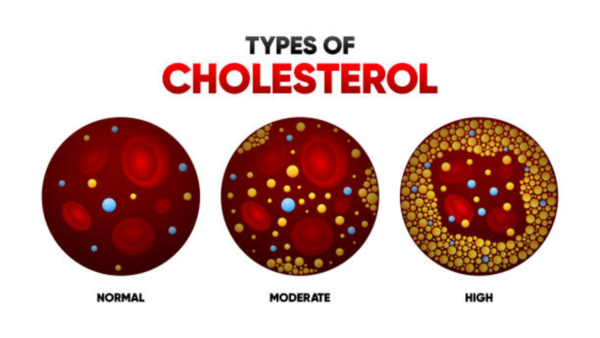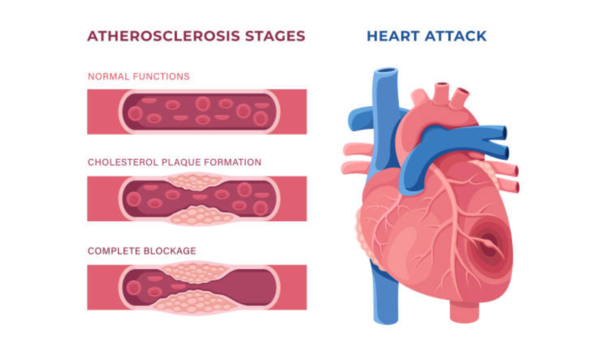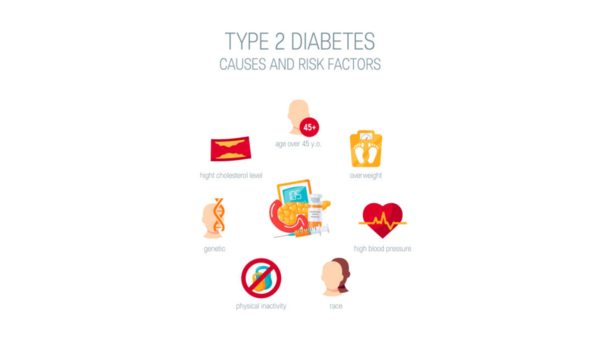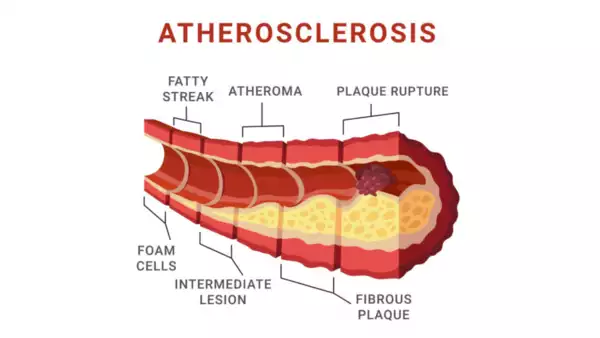Due to this misconception many people cut out fat from their diet.
Imagine cholesterol as managing ingredients in a recipe: a pinch of salt enhances flavor, but too much ruins the dish.Similarly, cholesterol is vital for building cells and producing hormones, but excessive LDL cholesterol (the “bad” kind) can clog arteries over time, increasing the risk of heart disease.
Understanding this balance is crucial. It’s not just about cutting out all fats or cholesterol from your diet but making smart choices. Think of it as maintaining a well-oiled machine: regular exercise, a balanced diet rich in fruits, vegetables, and whole grains, and knowing your cholesterol levels through regular check-ups are all part of keeping your heart healthy.
What is cholesterol?
Cholesterol often stirs up a mix of confusion and concern when it comes to discussions about health. But what exactly is cholesterol, and why does it matter? To put it simply, cholesterol is a waxy substance found in the fats (lipids) circulating in our blood. While it’s crucial for our bodies to function properly, too much of certain types of cholesterol can pose health risks, particularly to our cardiovascular system.
Imagine cholesterol as a versatile player in your body, performing essential roles in different sections. It’s involved in building cell membranes, a fundamental job that ensures cells remain structurally sound and functional. Cholesterol serves as a precursor for producing hormones like estrogen and testosterone, pivotal for regulating various bodily functions, including reproduction and metabolism. Without adequate cholesterol, our bodies wouldn’t be able to perform these vital tasks effectively.

Cholesterol isn’t something we solely obtain from our diet; our liver also produces it naturally. This dual origin means our cholesterol levels are influenced by both what we eat and how our bodies metabolize fats. The types of cholesterol we often hear about are low-density lipoprotein (LDL) and high-density lipoprotein (HDL). LDL cholesterol is dubbed the “bad” cholesterol because high levels can lead to the buildup of plaque in our arteries, increasing the risk of heart disease. On the other hand, HDL cholesterol is often hailed as the “good” cholesterol because it helps remove LDL cholesterol from the bloodstream, transporting it to the liver for elimination.
Balancing these cholesterol types is crucial for maintaining heart health. When LDL cholesterol levels are too high, it can contribute to atherosclerosis—a condition where plaque buildup narrows and stiffens arteries, potentially leading to heart attacks and strokes. Conversely, higher levels of HDL cholesterol are associated with a lower risk of heart disease, as it helps protect against arterial damage caused by LDL cholesterol.
Understanding cholesterol involves recognizing that it’s not inherently good or bad—it’s the balance and ratios that matter. Many factors influence our cholesterol levels, including genetics, diet, physical activity, and overall lifestyle choices. For instance, a diet high in saturated and trans fats can elevate LDL cholesterol levels, while a diet rich in fruits, vegetables, whole grains, and healthy fats can help lower LDL cholesterol and raise HDL cholesterol.
Understanding Blood Pressure and Cholesterol readings
Cholesterol levels can vary widely among individuals. Genetics play a significant role, influencing how our bodies produce and process cholesterol. Some people may have a genetic predisposition to higher cholesterol levels, even with a healthy lifestyle, necessitating closer monitoring and possibly medical intervention to manage their cholesterol effectively.
Cholesterol is a multifaceted substance with critical roles in our bodies, from cell structure and hormone production to brain health and infant development. While it’s necessary for these functions, maintaining a balanced cholesterol profile is crucial for heart health.
When bad cholesterol level increases in the body it leads to atherosclerosis
Atherosclerosis, the underlying cause of most heart attacks, involves the gradual buildup of plaque in the arteries. This process is influenced by multiple factors, with cholesterol playing a significant role:
Elevated LDL cholesterol levels can lead to the accumulation of cholesterol-rich plaques within the arterial walls. These plaques consist of cholesterol, fatty substances, cellular debris, and calcium deposits.
The presence of LDL cholesterol within the arterial wall triggers an inflammatory response. Immune cells, such as macrophages, engulf the cholesterol particles, leading to the formation of foam cells. Over time, this process contributes to the development of fatty streaks and fibrous plaques.

As plaques grow, they can narrow the arteries, reducing blood flow to vital organs, including the heart. This reduction in blood flow can result in angina (chest pain) or, if severe, a heart attack.
But, is cholesterol the only risk for the heart?
Cholesterol certainly plays a significant role in heart health, but it’s important to recognize that it’s not the sole factor influencing cardiovascular disease. Our heart’s well-being is influenced by a complex interplay of various factors, each contributing uniquely to our overall risk profile.
Consider lifestyle habits as one of the most influential factors. Smoking, for instance, is a major contributor to heart disease. It damages the lining of the arteries, leading to a buildup of fatty deposits, which can ultimately block blood flow to the heart. Quitting smoking can dramatically reduce this risk and improve overall heart health. Similarly, regular physical activity is crucial. Exercise helps maintain a healthy weight, lowers blood pressure, and improves cholesterol levels. It also reduces stress, which indirectly benefits heart health.
Smoking and Heart Health- Breaking Free from the Habit
Dietary choices also have a profound impact. Consuming a diet high in saturated and trans fats raises LDL cholesterol levels and contributes to arterial plaque buildup. On the other hand, a diet rich in fruits, vegetables, whole grains, and healthy fats (like those found in nuts, seeds, and fatty fish) can lower cholesterol and reduce the risk of heart disease. Portion control and moderation play significant roles here, too, ensuring that we don’t over consume even healthy foods.
Beyond lifestyle factors, genetics also play a crucial role in heart disease risk. Family history can predispose individuals to conditions like high cholesterol, hypertension, and diabetes, all of which increase the likelihood of developing heart disease. Understanding these genetic predispositions through regular medical check-ups allows for early intervention and management strategies tailored to individual risk profiles.
Age and gender influence heart health. As we age, our arteries naturally become less flexible and more prone to damage. This aging process, combined with a lifetime of other risk factors, increases the likelihood of heart disease. Men generally face a higher risk of heart disease earlier in life, but women’s risk increases after menopause, highlighting the importance of gender-specific considerations in heart health management.
Stress and mental health also deserve attention in the context of heart disease. Chronic stress can contribute to unhealthy behaviors like overeating or smoking, elevate blood pressure, and strain the cardiovascular system. Finding effective stress management techniques, such as mindfulness, yoga, or engaging hobbies, can mitigate these effects and improve overall heart health.
Diabetes and hypertension are also significant contributors to heart disease risk. Both conditions affect the cardiovascular system directly, increasing the likelihood of arterial damage and heart complications. Managing blood sugar levels through medication, diet, and lifestyle changes is essential for reducing the impact of diabetes on heart health. Similarly, controlling blood pressure through medication, dietary adjustments (like reducing salt intake), and stress management helps prevent hypertension-related heart issues.

Environmental factors, such as air pollution and exposure to toxins, can also impact heart health. Poor air quality has been linked to an increased risk of heart attacks and strokes, emphasizing the importance of reducing exposure and advocating for cleaner environments. Occupational hazards, like exposure to chemicals or prolonged sitting, can also influence cardiovascular health and should be addressed through workplace safety measures and regular physical activity.
When is cholesterol not a threat to health?
Cholesterol often gets a bad reputation in discussions about health, but the truth is, it’s not always a threat. In fact, cholesterol is essential for our bodies to function properly. It plays a vital role in building cell membranes, producing hormones like estrogen and testosterone, and aiding in the digestion of fats. Without cholesterol, our bodies wouldn’t be able to perform these critical functions necessary for overall health and well-being.
Understanding cholesterol’s role as both a friend and foe is key. Not all cholesterol is harmful; it’s the balance and types of cholesterol that matter. High-density lipoprotein (HDL) cholesterol, often referred to as “good” cholesterol, helps transport cholesterol away from the arteries to the liver, where it’s processed and eliminated from the body. Having higher levels of HDL cholesterol is actually beneficial and protective against heart disease.
Heart failure in men and women: Understanding the differences in symptoms
Cholesterol levels can vary widely among individuals based on genetics and lifestyle factors. Some people naturally have higher cholesterol levels due to genetic predispositions, yet they may still maintain excellent heart health through other factors like diet, exercise, and overall lifestyle choices. It’s not solely about the numbers on a cholesterol test but rather the broader context of individual health and well-being.
For many, managing cholesterol levels through lifestyle choices is effective in maintaining optimal health. A balanced diet rich in fruits, vegetables, whole grains, and healthy fats can help regulate cholesterol levels by reducing the intake of saturated and trans fats, which contribute to higher LDL (low-density lipoprotein) cholesterol levels. Regular physical activity also boosts HDL cholesterol while lowering LDL cholesterol and triglycerides, supporting overall heart health.
Cholesterol becomes less of a threat when it’s managed effectively through proactive healthcare practices. Regular medical check-ups allow healthcare providers to monitor cholesterol levels and assess overall cardiovascular health. For some individuals, medications may be necessary to control cholesterol levels, particularly when lifestyle changes alone aren’t sufficient. This proactive approach ensures that cholesterol levels remain within healthy ranges, reducing the risk of heart disease and other related conditions.
Heart diseases in women: Experts weighs in on latest worrying trends, signs and symptoms
Interestingly, recent research has highlighted the potential benefits of cholesterol in certain situations. For example, cholesterol may play a protective role in cognitive function and brain health. It’s essential for the formation of brain cell membranes and the production of neurotransmitters crucial for communication between brain cells. Some studies suggest that maintaining adequate cholesterol levels may support cognitive function and reduce the risk of neurodegenerative diseases like Alzheimer’s.
Moreover, cholesterol is vital during pregnancy and infancy. It plays a crucial role in fetal development, helping to form the baby’s organs and brain. Breast milk naturally contains cholesterol, which is essential for the baby’s growth and development. Mothers produce cholesterol-rich breast milk to ensure their infants receive the nutrients needed for optimal growth, immune function, and brain development during this critical stage of life.

Cholesterol can be a marker of overall health in certain contexts. For example, very low cholesterol levels (hypolipidemia) may be associated with other health conditions or nutritional deficiencies. In some cases, excessively low cholesterol levels can indicate underlying health issues that require medical attention. Therefore, maintaining a balanced cholesterol profile that aligns with individual health needs is essential for overall well-being.
Cholesterol is not inherently harmful; it’s a vital substance that our bodies need to function properly. When managed effectively through lifestyle choices, proactive healthcare practices, and personalized medical care, cholesterol can support overall health and well-being.
Understanding hypertension as a major risk factor for the heart
Source link
Modified by Maaaty at Cheap Generic Pharmacy

